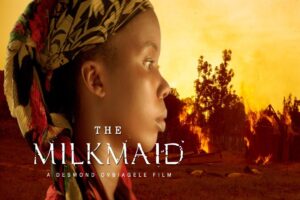
The Milkmaid is a compelling Nigerian drama that unflinchingly portrays the devastating human toll of insurgency and extremism in rural Africa. Written and directed by Desmond Ovbiagele, this critically acclaimed film weaves a deeply personal and poignant narrative, inspired by real-life events, that examines the plight of women trapped in cycles of violence, oppression, and resilience.
Set in a Fulani pastoral community, the story centers on Aisha (played with remarkable sensitivity by Anthonieta Kalunta), a young milkmaid whose peaceful life is violently upended when insurgents raid her village. During the chaos, she and her younger sister Zainab (Maryam Booth) are captured and forcibly taken into the militants’ camp. Separated from her sister, Aisha becomes a prisoner of circumstance, enduring unimaginable hardships. However, her indomitable spirit propels her on a perilous journey to reunite with Zainab, forcing her to confront the horrors of captivity, radicalization, and survival.
Aisha’s story is not just one of survival but also a vivid exploration of human resilience and the complexities of cultural and religious identity. Her experiences shed light on the struggles of women who endure forced marriages, systematic indoctrination, and the loss of personal freedom within the framework of insurgent-controlled territories. Anthonieta Kalunta’s portrayal of Aisha is a tour de force, capturing the character’s vulnerability and unyielding determination, while Maryam Booth delivers a heart-wrenching performance as the younger sister, torn between loyalty and survival in a harrowing environment.
The film’s technical elements elevate its emotional and thematic depth. Yinka Edward’s cinematography captures the sweeping beauty of the Nigerian Sahel, contrasting the natural splendor of the region with the dark, claustrophobic world of conflict and terror. The vibrant and authentic use of Hausa dialogue not only immerses the audience in the cultural fabric of the story but also emphasizes the deeply rooted traditions that often clash with the violent disruptions brought by extremism.
The Milkmaid tackles difficult and timely themes, such as gender inequality, religious extremism, and the resilience of communities facing systemic violence. It goes beyond the surface of insurgency to explore the psychological and emotional impact on women, highlighting their strength and resourcefulness in the face of unimaginable adversity. The film also delves into the complex interplay between culture and faith, presenting a nuanced perspective on how religion can be manipulated to justify oppression.
Desmond Ovbiagele’s meticulous storytelling and bold direction make The Milkmaid a landmark achievement in Nigerian cinema. The film’s unapologetic honesty in addressing sensitive issues has sparked important conversations about insurgency, the exploitation of women in conflict zones, and the urgent need for societal reform.
The Milkmaid earned international recognition as Nigeria’s official submission for the Best International Feature Film category at the 93rd Academy Awards. While it did not secure a nomination, the film garnered widespread acclaim for its courage, artistry, and powerful social message.
As a piece of art, The Milkmaid is not just a cinematic experience but a vital narrative that amplifies the voices of the silenced and shines a light on one of the most pressing issues of our time. Its poignant storytelling, stunning visuals, and unforgettable performances make it a must-watch for anyone interested in the intersection of art and advocacy.




